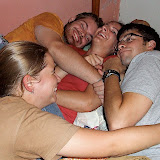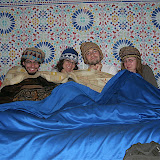Praxis Weekend
My praxis weekend. Although it was quite eventful, I had a lot of fun just hanging out with the leaders of my praxis experience. I actually stayed with Lolo, the only male member of the Cooperative. His wife, Aída, and he have two little girls: Karen, 3 years old, and María José, who’s about one and a half. When the three of us (Stephanie, Jenn, and I—our praxis group) arrived at Oti’s house, it was around 5 pm, and we just sat there talking with everyone and helped a little to make pupusas. Normally, pupusas aren’t very good for my system, as many places make them with lard and/or a lot of oil and grease. For those of you who aren’t familiar with this typically Salvadoran and I believe Honduran delicacy, they’re basically stuffed tortillas grilled on a flat surface, if you can imagine that. We have very thick tortillas here, unlike the Mexican ones found in the states, and a little smaller. I think they use the same base for the tortilla that they do for the pupusa (and if not, they’re very similar. Anyway, they basically cover the filling in the “masa”—the starch base—and grill it off. The filling can be anything from beans and cheese, pork, squash and beans, and many other sorts of combinations. They’re extremely popular here, pretty much the national food; there are pupuserias everywhere, literally. Every Thursday night we go for pupusas as a group at a place down the street. But, these pupusas made in house by Oti and Aída and the woman Jenn was staying with, were the best ones I’ve ever tasted. They also made by hand the curtido (a coleslaw-type stuff that goes on top of pupusas) and the tomato salsa stuff. Wow, was that a good meal. After dinner, we sat around and talked, watched all the children fight and cry, laughing the whole time, and then Lolo, his family, and I went back to their house. After a short time on the couch, Aída and the girls went to bed, and falling asleep, I chose to do the same. Let’s just say I got a lot of sleep that night: a lot of time I needed.
The next morning, when I awoke about an hour and a half before we had to be at Oti’s to head over to the Cooperative, Aída was in the kitchen cooking and commented a couple times whether or not I had slept well and/or woken up early. I told her that I’m used to waking up early and can do so when I so choose, and she responded that most of the other students who had stayed there before woke up late. From there, we had a nice discussion about eating and foods and the necessity to try everything, together with Lolo when he joined us for breakfast. We had some scrambled eggs, beans, fried plantains, and some good coffee for breakfast, and I loved it. It’s a shame that people don’t like different foods, we agreed. It was the first time—and definitely not the last—that I felt that I was eating something special, that they always didn’t eat this way. Oti and Lolo, as with many other people in this community, are pretty middle-class by Salvadoran standards. It’s pretty common in any class, even houses with dirt floors, to have TVs and stereo systems, but Lolo and Oti and most of the people we visit have concrete floors and relatively clean houses. Anyway, we all discussed this upon arriving home, and it’s been a constant topic of conversation about Salvadoran hospitality. Because we’re guests, they will pull out all the stops, all the bells and whistles, when all we really want is just to experience life for how it truly is.
Anyway, from what we understood beforehand, that morning we were going to a gathering of many of the “socias.” Evidently, when we arrived, there weren’t as many women as were expected, but either way, the festivities began. I didn’t really know what to expect—actually, I was thinking it would be a question/answer session or some function for us to get to know the women members of the Coop who we don’t normally see. But, it was actually a women’s group, of sorts. We did a few activities, while seated around a singular candle and pieces of different-colored cloth. The first was just a reflection on the candle, cloths, and what everything meant to us. The second one was sort of a discussion on being women in this, Salvadoran society. It was very interesting both from a man’s perspective and as a foreigner, but it really wasn’t awkward. Some of the women felt a need to apologize directly to me after comments, as if I were a representative of all men. To my surprise, I had some stuff to say, specifically about my mother and sister and their strong qualities and my mother’s teaching of my sister—sort of how I grew up in my house and how I see Salvadoran society thus far. There’s a strong sense of machismo, which people tend to say all the time. It manifests itself anywhere from spousal abuse to disgusting comments to women on the street and anywhere in between. The last exercise was supposed to have them get in touch with their bodies and feel something at every part, like an emotion tied to places. Surprisingly, I had something to say about that, as well. It’s very difficult to enunciate emotions and strong feelings in Spanish without a broad vocabulary for such things, and that barrier along with the normal difficulty in putting into words such things made talking difficult—but actually much easier than I expected. Those women there were such a strong group of people, very much in touch with their rights and their roles, and they emphasized the need to support each other and to spread the message to women not as fortunate. It’s such a shame to see the way many man in this society comport themselves and treat their opposite sex, but these women really give one hope for a better future. I really saw the inner-workings of what is a grass-roots attempt at greater rights.
That afternoon, we did some more house visits, to a women who used to work very closely with the praxis students in Mariona, and to an elderly women whose husband died and left her to care for their eight children. This elderly woman, as she didn’t have many teeth (if any at all), was very difficult to understand, which was a shame because her story was a very moving one that said things about Salvadoran life.
That evening, I had dinner back at Lolo and his family’s and then went to bed relatively early again, especially because we had to leave at 7:30 am the next morning for 8 am mass. Oofa.
Mass that morning was okay, nothing great, really from what I thought. The pastor was a younger man from Spain (evident from his accent), and his message wasn’t really anything new. From some of the masses here, I’ve noticed that there really isn’t such an emphasis on writing out sermons and homilies but rather having some idea of where you want to go and just heading down that road. He took some very cheap shots on the US, which sort of made me angry, and he didn’t really say anything novel. Perhaps this is what the Salvadoran community needs, in terms of motivation and continued praise and encouragement. Who knows, but either way, church was okay. For some humor in the middle of the service, a dog walked down the front aisle and was just chillin in the middle of it for about 15 minutes. He walked around a little, scratched his fleas, but no one did anything. Just an interesting cultural observation.
On the bus ride back, a couple interesting cultural differences hit me again. The buses are many times very crowded, with people having to stand in the aisles (that’s nothing new). But, because strollers are very uncommon in most places, women are forced to hold their children all the time, even when standing on the shaky buses. However, when Aída was carrying María José, a women next to her offered to hold her baby, and Aída gratefully accepted. It didn’t really seem to me like a question/answer, more eye-contact and understanding. They both knew that it would be a bigger problem for the woman sitting down to stand up and try to change seats to allow Aída to sit down, so they just understood each other. It hit me then that most women in the States would probably prefer to hold their baby than allow a complete stranger to do so on public transportation, but this is just another sign of how everyone here is interdependent through necessity. Also, on that ride home, the bus just pulled into a gas station, and the driver hopped out to fill it up.
That morning, all of us (Stephanie, Jenn, I, and our families) prepared for and cooked a steak lunch outside on the charcoal grill. Wow, was that a good meal, as I hadn’t had steak like that in a while, definitely since before I arrived. It was such a delightful treat, probably that we didn’t deserve. After lunch, we sat and chatted again and shared some good laughs before going home around 2.
Upon arriving home, everyone shared their different stories of their unique praxis weekends. Some had good times, moving experiences, difficult nights (Patricio slept in a very poor house with big roaches, Roe and Colin experienced an awesome outdoor dance party, and there are so many more stories). I realized even further that although I’m enjoying my praxis site, I’m really not being moved that much or experiencing anything novel. It’s very fluffy and fun and nice and packaged. We don’t hear much about gangs or severe poverty or terrible violence (which apparently is plaguing Mariona very badly, restricting our ability to visit parts of the community), or even immigration.
I have a couple more memories/reflections on praxis that happened after the weekend in this past week. On Wednesday, we visited the parents of a priest who was martyred in the late seventies. He was a relatively famous martyr, and these parents lost all four of their other sons as well—three in the guerilla forces and one in a wrong accusation by the government during the war. However, it was very difficult to understand the father, who had Parkinson’s disease, and although the mother was a bit more intelligible, her sentences were a bit disjointed. Later that day, we had lunch at a woman’s house, a person we had met that past weekend. Towards the end, her son showed up to eat. He was in his last year of high school, headed to college next year. He said he played piano and then ran next door to get a small keyboard, and he was really good. He also talked a little about gangs and their effect in his area and with his friends, which was extremely interesting, as we really haven't heard that much testimony about their presence.
Anyway, we'll see with praxis. It's up and down, and I think it's gonna get better at certain times. Paz y amor--
AMDG,
Antonio
The next morning, when I awoke about an hour and a half before we had to be at Oti’s to head over to the Cooperative, Aída was in the kitchen cooking and commented a couple times whether or not I had slept well and/or woken up early. I told her that I’m used to waking up early and can do so when I so choose, and she responded that most of the other students who had stayed there before woke up late. From there, we had a nice discussion about eating and foods and the necessity to try everything, together with Lolo when he joined us for breakfast. We had some scrambled eggs, beans, fried plantains, and some good coffee for breakfast, and I loved it. It’s a shame that people don’t like different foods, we agreed. It was the first time—and definitely not the last—that I felt that I was eating something special, that they always didn’t eat this way. Oti and Lolo, as with many other people in this community, are pretty middle-class by Salvadoran standards. It’s pretty common in any class, even houses with dirt floors, to have TVs and stereo systems, but Lolo and Oti and most of the people we visit have concrete floors and relatively clean houses. Anyway, we all discussed this upon arriving home, and it’s been a constant topic of conversation about Salvadoran hospitality. Because we’re guests, they will pull out all the stops, all the bells and whistles, when all we really want is just to experience life for how it truly is.
Anyway, from what we understood beforehand, that morning we were going to a gathering of many of the “socias.” Evidently, when we arrived, there weren’t as many women as were expected, but either way, the festivities began. I didn’t really know what to expect—actually, I was thinking it would be a question/answer session or some function for us to get to know the women members of the Coop who we don’t normally see. But, it was actually a women’s group, of sorts. We did a few activities, while seated around a singular candle and pieces of different-colored cloth. The first was just a reflection on the candle, cloths, and what everything meant to us. The second one was sort of a discussion on being women in this, Salvadoran society. It was very interesting both from a man’s perspective and as a foreigner, but it really wasn’t awkward. Some of the women felt a need to apologize directly to me after comments, as if I were a representative of all men. To my surprise, I had some stuff to say, specifically about my mother and sister and their strong qualities and my mother’s teaching of my sister—sort of how I grew up in my house and how I see Salvadoran society thus far. There’s a strong sense of machismo, which people tend to say all the time. It manifests itself anywhere from spousal abuse to disgusting comments to women on the street and anywhere in between. The last exercise was supposed to have them get in touch with their bodies and feel something at every part, like an emotion tied to places. Surprisingly, I had something to say about that, as well. It’s very difficult to enunciate emotions and strong feelings in Spanish without a broad vocabulary for such things, and that barrier along with the normal difficulty in putting into words such things made talking difficult—but actually much easier than I expected. Those women there were such a strong group of people, very much in touch with their rights and their roles, and they emphasized the need to support each other and to spread the message to women not as fortunate. It’s such a shame to see the way many man in this society comport themselves and treat their opposite sex, but these women really give one hope for a better future. I really saw the inner-workings of what is a grass-roots attempt at greater rights.
That afternoon, we did some more house visits, to a women who used to work very closely with the praxis students in Mariona, and to an elderly women whose husband died and left her to care for their eight children. This elderly woman, as she didn’t have many teeth (if any at all), was very difficult to understand, which was a shame because her story was a very moving one that said things about Salvadoran life.
That evening, I had dinner back at Lolo and his family’s and then went to bed relatively early again, especially because we had to leave at 7:30 am the next morning for 8 am mass. Oofa.
Mass that morning was okay, nothing great, really from what I thought. The pastor was a younger man from Spain (evident from his accent), and his message wasn’t really anything new. From some of the masses here, I’ve noticed that there really isn’t such an emphasis on writing out sermons and homilies but rather having some idea of where you want to go and just heading down that road. He took some very cheap shots on the US, which sort of made me angry, and he didn’t really say anything novel. Perhaps this is what the Salvadoran community needs, in terms of motivation and continued praise and encouragement. Who knows, but either way, church was okay. For some humor in the middle of the service, a dog walked down the front aisle and was just chillin in the middle of it for about 15 minutes. He walked around a little, scratched his fleas, but no one did anything. Just an interesting cultural observation.
On the bus ride back, a couple interesting cultural differences hit me again. The buses are many times very crowded, with people having to stand in the aisles (that’s nothing new). But, because strollers are very uncommon in most places, women are forced to hold their children all the time, even when standing on the shaky buses. However, when Aída was carrying María José, a women next to her offered to hold her baby, and Aída gratefully accepted. It didn’t really seem to me like a question/answer, more eye-contact and understanding. They both knew that it would be a bigger problem for the woman sitting down to stand up and try to change seats to allow Aída to sit down, so they just understood each other. It hit me then that most women in the States would probably prefer to hold their baby than allow a complete stranger to do so on public transportation, but this is just another sign of how everyone here is interdependent through necessity. Also, on that ride home, the bus just pulled into a gas station, and the driver hopped out to fill it up.
That morning, all of us (Stephanie, Jenn, I, and our families) prepared for and cooked a steak lunch outside on the charcoal grill. Wow, was that a good meal, as I hadn’t had steak like that in a while, definitely since before I arrived. It was such a delightful treat, probably that we didn’t deserve. After lunch, we sat and chatted again and shared some good laughs before going home around 2.
Upon arriving home, everyone shared their different stories of their unique praxis weekends. Some had good times, moving experiences, difficult nights (Patricio slept in a very poor house with big roaches, Roe and Colin experienced an awesome outdoor dance party, and there are so many more stories). I realized even further that although I’m enjoying my praxis site, I’m really not being moved that much or experiencing anything novel. It’s very fluffy and fun and nice and packaged. We don’t hear much about gangs or severe poverty or terrible violence (which apparently is plaguing Mariona very badly, restricting our ability to visit parts of the community), or even immigration.
I have a couple more memories/reflections on praxis that happened after the weekend in this past week. On Wednesday, we visited the parents of a priest who was martyred in the late seventies. He was a relatively famous martyr, and these parents lost all four of their other sons as well—three in the guerilla forces and one in a wrong accusation by the government during the war. However, it was very difficult to understand the father, who had Parkinson’s disease, and although the mother was a bit more intelligible, her sentences were a bit disjointed. Later that day, we had lunch at a woman’s house, a person we had met that past weekend. Towards the end, her son showed up to eat. He was in his last year of high school, headed to college next year. He said he played piano and then ran next door to get a small keyboard, and he was really good. He also talked a little about gangs and their effect in his area and with his friends, which was extremely interesting, as we really haven't heard that much testimony about their presence.
Anyway, we'll see with praxis. It's up and down, and I think it's gonna get better at certain times. Paz y amor--
AMDG,
Antonio








0 Comments:
Post a Comment
<< Home